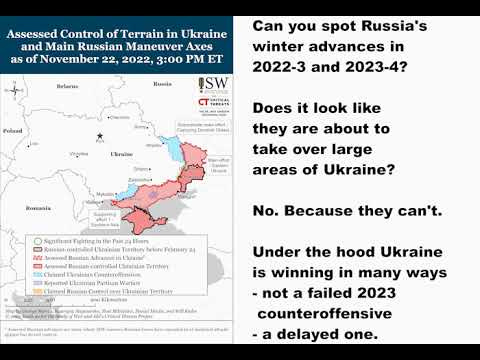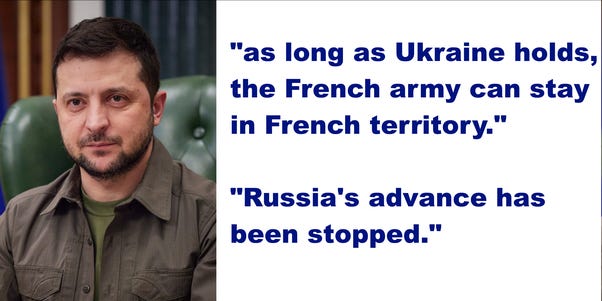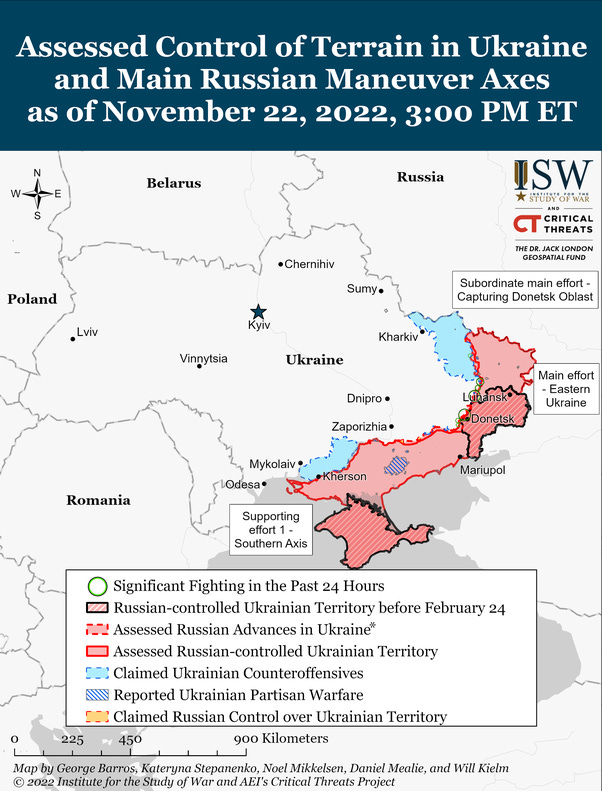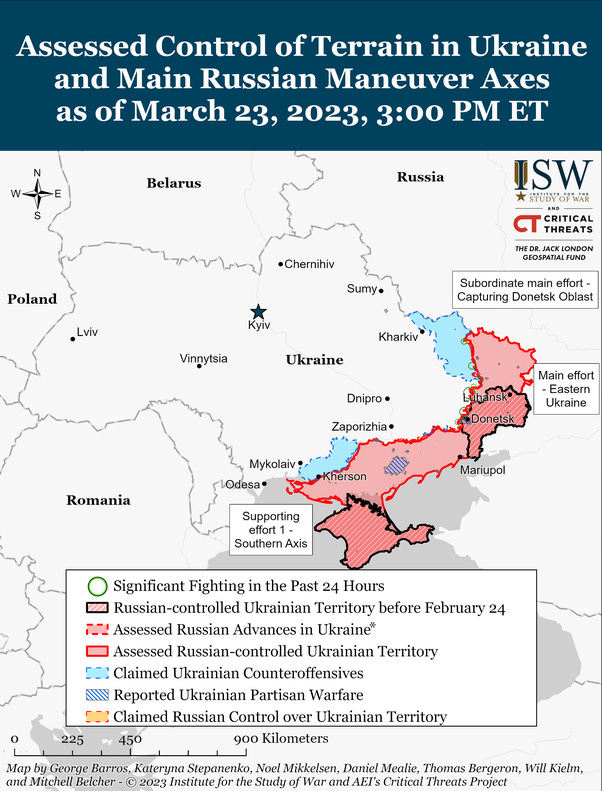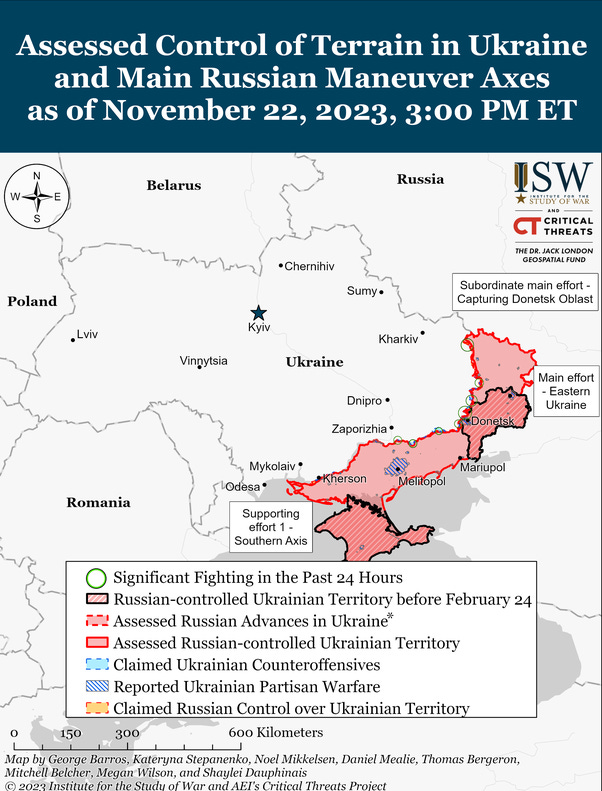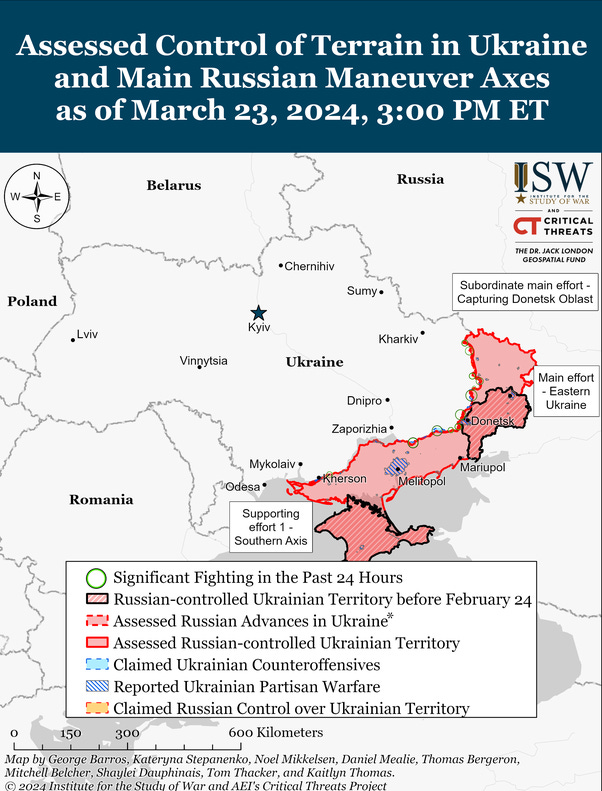Can you spot Russia’s winter advances in 2022–3 and 2023–4? Does it look like they will take over large areas of Ukraine? No. Because they can’t
Text on graphic:
Can you spot Russia’s winter advances in 2022–3 and 2023–4?
Does it look like they are about to take over large areas of Ukraine?
No. Because they can’t.
Under the hood, Ukraine is winning in many ways
not a failed 2023 counteroffensive
a delayed one
Zelensky recently said on French TV
"as long as Ukraine holds, the French army can stay in French territory."
Zelensky also said the situation on the front line is
"much better than during the last three months,"
and that
"Russia's advance has been stopped."
Graphic from: Volodymyr Zelenskyy in 2022
EXAMPLES OF DIPLOMATS / GENERALS SAYING THERE ISN’T A RISK OF A WORLD WAR
EU’s chief diplomat Josep Borrell
“The calls for European leaders to be aware of the challenges they are facing are good but we don’t have to exaggerate either.
…
We live in peace, we support Ukraine, we are not part of this war we just support Ukraine and we have to prepare for the future, augmenting the defence capacity of our industry, but don’t frighten people unneccessarily, war is not imminent. What is imminent is the need to support for Ukraine,” he said.
From: EU leaders call for ‘immediate humanitarian pause’ in Gaza – as it happened
Admiral Radakin, head of the UK armed forces:
ADMIRAL RADAKIN: First, let me scotch some of the more sensationalist headlines of late.
We are not on the cusp of war with Russia.
We are not about to be invaded.
No one in the Ministry of Defence is talking about conscription in any traditional sense of the term.
Britain is safe.
We are safe because we are part of NATO, the world’s largest and strongest alliance and also because we are a responsible nuclear power
….
The biggest reason that Putin doesn’t want a conflict with NATO is because Russia will lose. And lose quickly. ...
Secondly, can we take some time to pause and reflect on Russia’s so-called ‘Special Military Operation’ in Ukraine? It was supposed to take between 3 days and 3 weeks. It was supposed to subjugate Ukraine’s population. It was supposed to take about two thirds of Ukraine’s territory. It was supposed to stop Ukraine joining NATO and the EU.
Putin has failed in all of these strategic objectives. At the operational level, Russia has demonstrated its continued inability to fight in a joint way. Its Air Force has failed to gain control of the air. Its Navy has seen 25% of its vessels in the Black Sea sunk or damaged by a country without a Navy and Ukraine’s maritime trade is reaching back to pre-war levels. Russia’s Army has lost nearly 3,000 tanks, nearly 1500 artillery pieces and over 5,000 armoured fighting vehicles.
At the tactical level, Russia gained Bahkmut – an area just over 40 square kilometres - after 9 months of fighting. Avdiivka is about 29 square kilometres. That has taken 5 months and some 17 thousand Russian lives and over 30 thousand injured.
To pose a realistic threat to NATO’s Eastern flank within the next 2-5 years, Russia will need to reconstitute her tanks and armoured vehicles, rebuild her stocks of long-range missiles and artillery munitions and extract itself from a protracted and difficult war in Ukraine.
I am not saying that Russia is not dangerous. It has demonstrated that with the aggression it employs both domestically and internationally.
But at the same time it is also significantly less capable than we anticipated following its disastrous illegal invasion into Ukraine. And it faces an even stronger straitjacket with the introduction of Finland and Sweden into NATO. Both these are true and can exist at the same time: a Russia that is more dangerous and less capable than we thought. And it is the more dangerous Russia that we and NATO are responding to.
. Chief of the Defence Chatham House Security and Defence Conference 2024 keynote speech
About general Radakin Admiral Sir Tony Radakin KCB ADC
See also my:
[WITH NEW VIDEO PRESENTATION]
AS SEPARATE GRAPHICS
See: Institute for the Study of War
See: Institute for the Study of War

